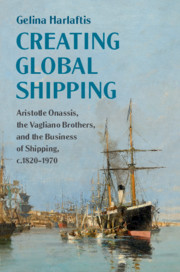 Creating Global Shipping
Creating Global Shipping Book contents
- Creating Global Shipping
- Cambridge Studies in the Emergence of Global Enterprise
- Creating Global Shipping
- Copyright page
- Dedication
- Contents
- Figures
- Maps
- Tables
- Preface
- Acknowledgments
- Abbreviations
- Introduction
- 1 The European and Greek Shipping Firm
- 2 The Vagliano Shipmasters
- 3 An International Trading House from Russia to the United Kingdom, 1850s‒1880s
- 4 The Russian Government v. Mari Vagliano, 1881–1887
- 5 The Vagliano Fleet and Innovation in Ship Management
- 6 Merchant to Shipowner
- 7 The Onassis Fleet, 1946–1975
- 8 The United States Government v. Aristotle Onassis, 1951–1958
- 9 Innovation in Global Shipping: The Onassis Business, 1946–1975
- 10 Diachronic Presence
- Select Bibliography
- Appendices
- Index of Names
- Index of Places
- Index of Terms
8 - The United States Government v. Aristotle Onassis, 1951–1958
Published online by Cambridge University Press: 19 August 2019
- Creating Global Shipping
- Cambridge Studies in the Emergence of Global Enterprise
- Creating Global Shipping
- Copyright page
- Dedication
- Contents
- Figures
- Maps
- Tables
- Preface
- Acknowledgments
- Abbreviations
- Introduction
- 1 The European and Greek Shipping Firm
- 2 The Vagliano Shipmasters
- 3 An International Trading House from Russia to the United Kingdom, 1850s‒1880s
- 4 The Russian Government v. Mari Vagliano, 1881–1887
- 5 The Vagliano Fleet and Innovation in Ship Management
- 6 Merchant to Shipowner
- 7 The Onassis Fleet, 1946–1975
- 8 The United States Government v. Aristotle Onassis, 1951–1958
- 9 Innovation in Global Shipping: The Onassis Business, 1946–1975
- 10 Diachronic Presence
- Select Bibliography
- Appendices
- Index of Names
- Index of Places
- Index of Terms
Summary
Exactly seventy years after Mari Vagliano was accused of conspiracy to defraud the Russian Imperial state, Aristotle Onassis was accused of conspiracy to defraud the United States Government. Comparing the two cases is enlightening: both of these international businessmen had to surpass a variety of hurdles on their way to revolutionizing the global shipping business. It all started in late 1950 when CIA agents, backed by photographic evidence revealed that New York based Greek shipping tycoons were carrying cargoes on American-built ships not only for the United States and its allies, but also for its enemies, North Korea and China. The FBI launched its investigation, the government took aggressive tactics that resulted in ship forfeitures arrest warrants in the US ports while there was a worldwide boycott on Onassis ships and attack to his whaling fleet. From 1954-1956, Onassis and the other Greek shipowners took part in lengthy negotiations, reaching final settlements with the US government. The case is indicative of how national interests try to restrict global economic activities, using foreign businessmen as scapegoats for their internal political and economic problems.
- Type
- Chapter
- Information
- Creating Global ShippingAristotle Onassis, the Vagliano Brothers, and the Business of Shipping, c.1820–1970, pp. 205 - 230Publisher: Cambridge University PressPrint publication year: 2019


